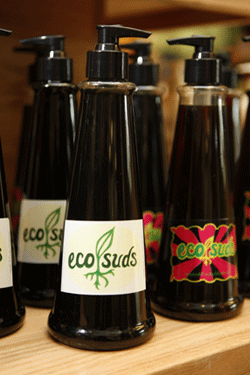Going Green
[Originally published by Vanderbilt News Service in The Vanderbilt View]

Some of Vanderbilt’s initiatives to reduce energy usage and help make the university more Earth-friendly include:
Lightbulbs: Projects like a recent lighting retrofit at Kirkland Hall are saving energy. Replacing old-style incandescent bulbs with more energy efficient lighting has reduced electricity consumption in the building by 15 percent.
Composting: Leaves from the more than 7,500 trees on campus are being gathered and taken to a massive compost pile that measures 90 feet long and seven feet high. To provide the oxygen needed for decay, the leaves are turned by a front-end loader. The result: lots of rich, dark compost that is spread back under the trees.
Recycling: In 2006, this highly visible campus effort yielded 716 tons of cardboard and paper, 10 tons of aluminum, five tons of plastic and 25 tons of computer and e-waste. Plans to expand the recycling effort are under way. Vanderbilt’s sustainability office and Plant Operations hosted the Green St. Patrick’s Day phone book and paper recycling drive March 17, and are in the process of organizing with Peabody College and Apple Computers a statewide electronics recycling event scheduled for May 14-17.
Green building: The Commons Center features daylight sensors to reduce the use of lighting, special windows to minimize energy loss, reflective concrete and roofing materials, and the use of paints and sealants with low levels of volatile organic compounds. The medical center’s Vanderbilt Health at One Hundred Oaks facility will incorporate green construction and pursue LEED certification.
Biodiesel fuel: The student-run Vanderbilt Biodiesel Initiative is converting used vegetable oil from Vanderbilt Dining Services and the Vanderbilt Medical Center into biodiesel fuel, which is used in campus vehicles such as lawn mowers, tractors, sweepers and chippers. More than 600 gallons have been produced to date, with plans to produce 75-100 gallons per week. A byproduct of the process is being used to create soap, called EcoSuds, for use in campus bathrooms.
Information gathering: The web site www.vanderbilt.edu/sustainvu provides the Vanderbilt community a gathering place where the latest news on sustainability efforts can be found, as well as information about how to become involved and channels for communicating suggestions to the sustainability office.

Leave a Response